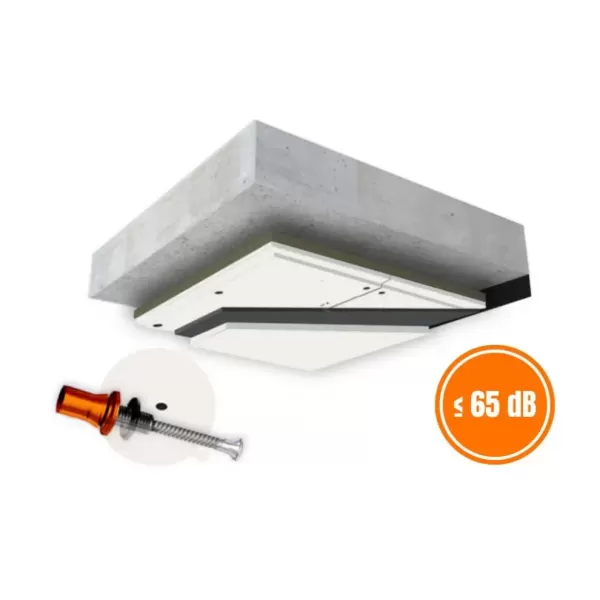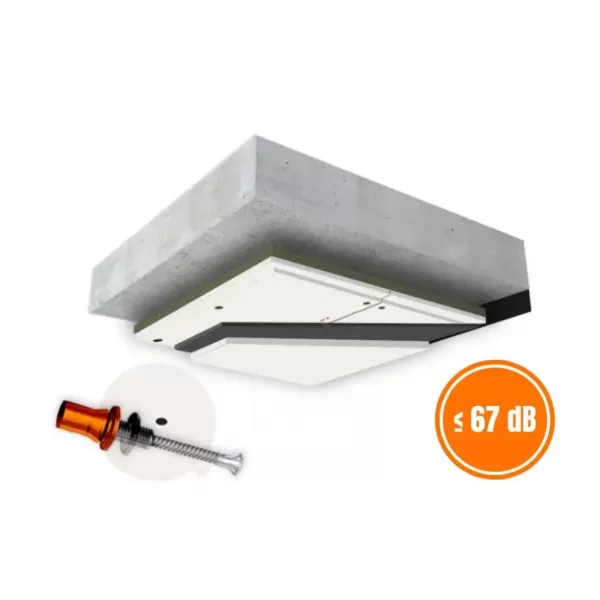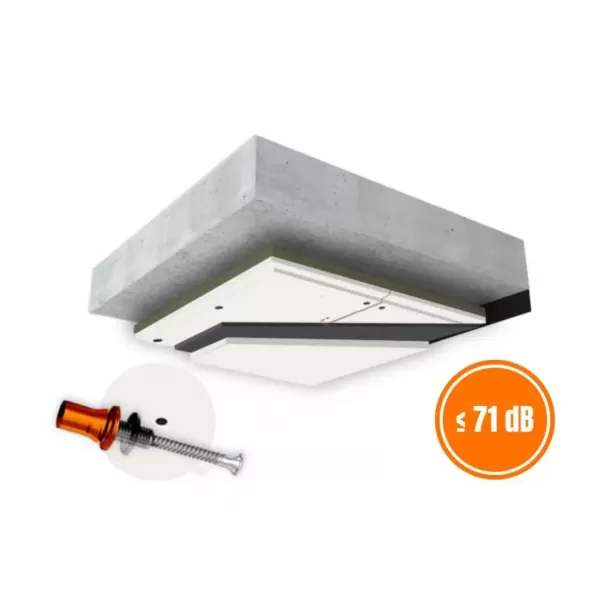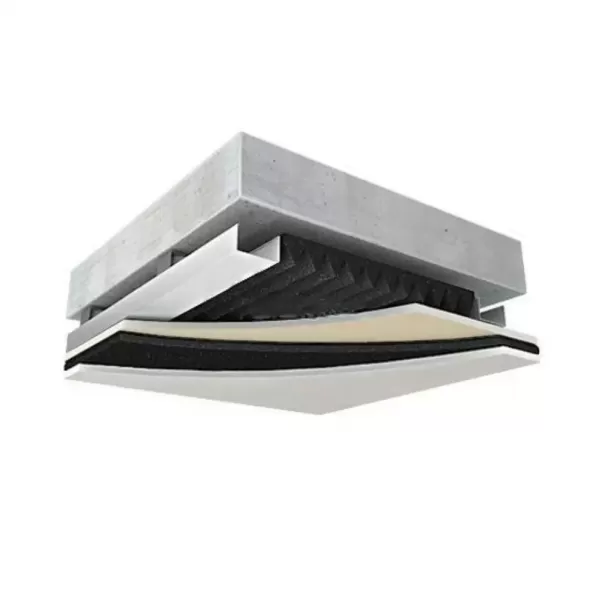Schallschutz für Decken
Die Schalldämmung einer Decke ist unerlässlich, um die Geräuschübertragung zwischen den Stockwerken zu verringern und eine ruhigere Umgebung zu schaffen. Ob Sie es mit lauten Nachbarn, geschäftigen Büroräumen oder Industrieanlagen zu tun haben, Lösungen zur Schalldämmung von Decken sind entscheidend für die Aufrechterhaltung von Komfort und Produktivität. Hier finden Sie ganz einfach eine Reihe von Produkten zur Schalldämmung von Decken, die Ihren Schalldämmungsanforderungen gerecht werden.
Schalldämmung von Decken verstehen
Bei der Schalldämmung von Decken werden Materialien und Techniken eingesetzt, um Schallwellen zu blockieren oder zu absorbieren und so zu verhindern, dass Lärm durch die Decke dringt. Eine effektive Schalldämmung von Decken kann sowohl Luftschall (wie Gespräche und Musik) als auch Trittschall (wie Schritte und sich bewegende Möbel) erheblich reduzieren.
Arten von Schallschutz- und Akustikdeckenprodukten
- Schalldichte Deckenplatten : Diese Platten wurden speziell zur Schalldämmung entwickelt und eignen sich perfekt für Bereiche, in denen eine maximale Lärmreduzierung erforderlich ist. Unser patentiertes C-MUTE SYSTEM™ ist in drei verschiedenen Varianten und Stärken erhältlich . C-MUTE SYSTEM™ wurde entwickelt, um den Trittschall und Luftschall in Wohn- und öffentlichen Räumen zu reduzieren.
- Akustische Deckenplatten : Diese Platten sind so konzipiert, dass sie Schall absorbieren und Echos und Nachhall in einem Raum reduzieren. Sie sind ideal für Büros, Klassenzimmer und Heimkinos. Denken Sie daran, dass Schallabsorption NICHT Schalldämmung ist . Dies sind zwei verschiedene Prozesse. Sie können Ihre Decke erst akustisch behandeln, nachdem Sie sie zuerst schallgedämmt haben.
- Schalldämmmaterialien für Decken : Zwischen Stockwerken angebrachte Dämmmaterialien können die Schallübertragung erheblich reduzieren und bieten eine wirksame Barriere gegen Lärm. Sie können unsere PolySound-Membran verwenden – eine synthetische, hochelastische Schalldämmmembran für Decken. Das Material basiert auf Polymeren und bleifreiem Bitumen. Es hat eine dämpfende Wirkung auf dünnwandige Platten (Blech, Polycarbonatplatten und Luftkanäle). Die Membran kann zur Schalldämmung von Luft- und Trittschall verwendet werden.
Vorteile der Deckenschalldämmung
- Lärmreduzierung : Minimieren Sie die Übertragung unerwünschter Geräusche aus oberen Stockwerken oder Nachbarräumen.
- Privatsphäre : Schaffen Sie einen privaten und vertraulichen Raum, indem Sie die Schallübertragung zwischen Räumen oder Stockwerken verhindern.
- Komfort und Produktivität : Reduzieren Sie Ablenkungen und schaffen Sie eine ruhige Umgebung, ideal für Wohn- und Geschäftsräume.
So isolieren Sie eine Decke schalldicht
Die Schalldämmung einer Decke erfordert mehrere Schritte und Materialien:
- Lärmquellen identifizieren : Bestimmen Sie, ob es sich um Luft- oder Trittschall handelt.
- Materialien auswählen : Wählen Sie aus schalldämmenden Deckenprodukten und -materialien, die Ihren spezifischen Anforderungen am besten entsprechen.
- Installation : Abhängig von Ihren spezifischen Anforderungen kann die Installation vom Anbringen von Schallschutzplatten an vorhandenen Decken bis zum späteren Einbau abgehängter Akustikdeckenplatten für eine umfassendere Akustik reichen.
DIY-Schallschutzlösungen
DECIBEL bietet Schallschutzprodukte an, die Sie einfach selbst installieren können und die mit ausführlichen Anweisungen und Videoanleitungen geliefert werden . Egal, ob Sie Ihr Zuhause, Ihr Büro oder Ihre Industrieräume schalldämmen möchten, unsere Produkte liefern professionelle Ergebnisse ohne Spezialwerkzeuge oder Fachwissen.
Lärmschutzbestimmungen
In verschiedenen Ländern gelten Vorschriften zur Lärmkontrolle in Gebäuden, insbesondere in Wohn- und Gewerbegebieten. Diese Vorschriften stellen sicher, dass der Lärmpegel innerhalb akzeptabler Grenzen gehalten wird, um das Wohlbefinden der Bewohner zu schützen. Die Einhaltung dieser Vorschriften erfordert häufig den Einsatz wirksamer Lösungen zur Schalldämmung von Decken.
Verbesserung der Gebäudeeffizienz mit Akustikdecken
Akustikdeckenlösungen verbessern nicht nur die Lärmkontrolle , sondern steigern auch die Gesamteffizienz des Gebäudes. Durch die Reduzierung der Lärmbelästigung und die Verbesserung der akustischen Qualität tragen diese Lösungen zu einer angenehmeren und produktiveren Umgebung bei, was zu einer höheren Zufriedenheit der Bewohner und einer besseren Leistung sowohl in Wohn- als auch in Geschäftsräumen führt.
Leistungsstärkste Materialien zur Schalldämmung von Decken
Die Wirksamkeit der Schalldämmung von Decken hängt weitgehend von den verwendeten Materialien ab. Zu den leistungsstärksten Materialien zählen hochdichte Akustikplatten, spezielle schalldichte Deckenplatten und eine wirksame Deckendämmung zwischen den Stockwerken. Diese Materialien wirken zusammen, um Schall zu blockieren und zu absorbieren und sorgen so für eine umfassende Lärmreduzierung.
Entdecken Sie unser Angebot an Akustikdeckenlösungen bei DECIBEL, um die perfekten Produkte für Ihre Schallschutzanforderungen zu finden und eine ruhigere, angenehmere Umgebung zu genießen.
Häufig gestellte Fragen
Um eine vorhandene Decke schalldicht zu machen, können Sie schalldichte Deckenplatten wie die des C-MUTE SYSTEM™ installieren, eine synthetische, hochelastische Schallschutzmembran wie die PolySound-Membran auftragen oder elastische Kanäle und zusätzliche Trockenbauschichten verwenden, um den Schall zu blockieren und zu absorbieren.
Eine 100-prozentige Schalldämmung zu erreichen, ist eine Herausforderung, aber Sie können den Lärm deutlich reduzieren, indem Sie mehrere Schichten schalldämmender Materialien verwenden, alle Lücken und Risse abdichten und Wände, Böden und Decken mit schalldämmenden Lösungen wie dem C-MUTE SYSTEM™ und dem C-Block System behandeln.
Ja, Sie können einen bereits gebauten Raum schalldicht machen, indem Sie schalldämmende Materialien auf vorhandenen Oberflächen anbringen, z. B. durch die Installation von schalldichten Platten des C-MUTE SYSTEM™, das Hinzufügen von schalldichten Trockenbauwänden oder das Anbringen von schalldämmenden Membranen wie PolySound.




